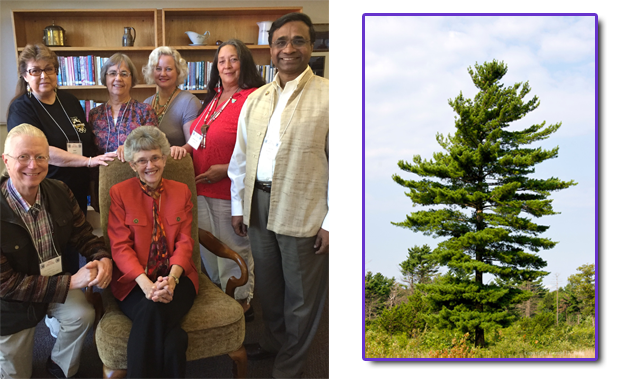 By The Rev. Christopher J. Kurien
By The Rev. Christopher J. Kurien
Director of Connectional Ministries
November is Native American Heritage Month, and the Eastern PA Conference Committee on Native American Ministries will have a special worship service on Sunday, Nov. 6, at 4 PM, at Innabah Camp & Retreat Center.
Prior to the service, we will plant a Peace Tree, traditionally an Eastern White Pine, which among the early Iroquois people and the Five Nations Confederacy was a symbol for peaceful unity. They used it in diplomacy with Westerners and buried weapons at the foot of the tree to seal peace agreements.
In such troubling, divisive times as these, this symbolic tree can be a prayerful plea for peace in our many contemporary struggles. It is a plea for peace in North Dakota where Native Americans and other advocates are protesting a crude oil pipeline set to invade their lands and violate their sacred burial places. And if it ruptures, which is a real danger, it will pollute their local drinking water.
Tree is a plea for peace in our nation
 This tree is a plea for peace in our nation, burdened with many conflicts, including racial and gender discrimination and religious intolerance, to name just a few. At the Northeastern Jurisdictional Conference in July the College of Bishops joined delegates in answering a Call to Action that challenges us all to strengthen our predominantly black churches and communities. We agreed to demonstrate our denomination’s commitment to the value and protection of all lives, but black lives especially, in the onslaught of shootings and killings happening in cities and towns across our nation.
This tree is a plea for peace in our nation, burdened with many conflicts, including racial and gender discrimination and religious intolerance, to name just a few. At the Northeastern Jurisdictional Conference in July the College of Bishops joined delegates in answering a Call to Action that challenges us all to strengthen our predominantly black churches and communities. We agreed to demonstrate our denomination’s commitment to the value and protection of all lives, but black lives especially, in the onslaught of shootings and killings happening in cities and towns across our nation.
Many in our nation are greatly disappointed with our presidential election campaigns and debates. One mother lamented to me the difficulty of sitting with her children to watch the debates but fearing the uncivil behavior they might witness. We expect better from our leaders. We are eager for words and actions that will bring us hope and a forward movement toward peace in our nation.
We will plant a tree of hope for peace in our world, where children are no longer dying and entire communities are no longer displaced by war, famine, natural disasters and diseases.
Our tree is also a plea for peace in our church, so deeply divided over the issue of human sexuality. The Council of Bishops is creating a study commission to recommend to General Conference “a way forward” for the sake of our vital mission to serve Christ and minister together to the world’s needs. We must pray for our bishops and all others involved.
Prayer is first answer to our concerns
I believe the first answer to many of these concerns is prayer, followed by appropriate, concerted actions.
Prayer is always the right place to begin because it brings us together in community before the God we love and serve. In prayer we can discern what God wants us to do about the issues that face us. In prayer we will be led to act in ways we did not anticipate, because prayer changes everything.
Let’s pray whenever we gather, wherever we gather. Commit to praying in worship, in small groups and in our Sunday school classes. Commit to praying in private or in family devotions.
Perhaps peace will come to us, our church, our nation and the world. As we prepare for another Advent season, I pray that our Tree of Peace grows strong in the fertile soil of our faith and commitment, and that the Prince of Peace will bring us healing, wholeness and a future with hope.

